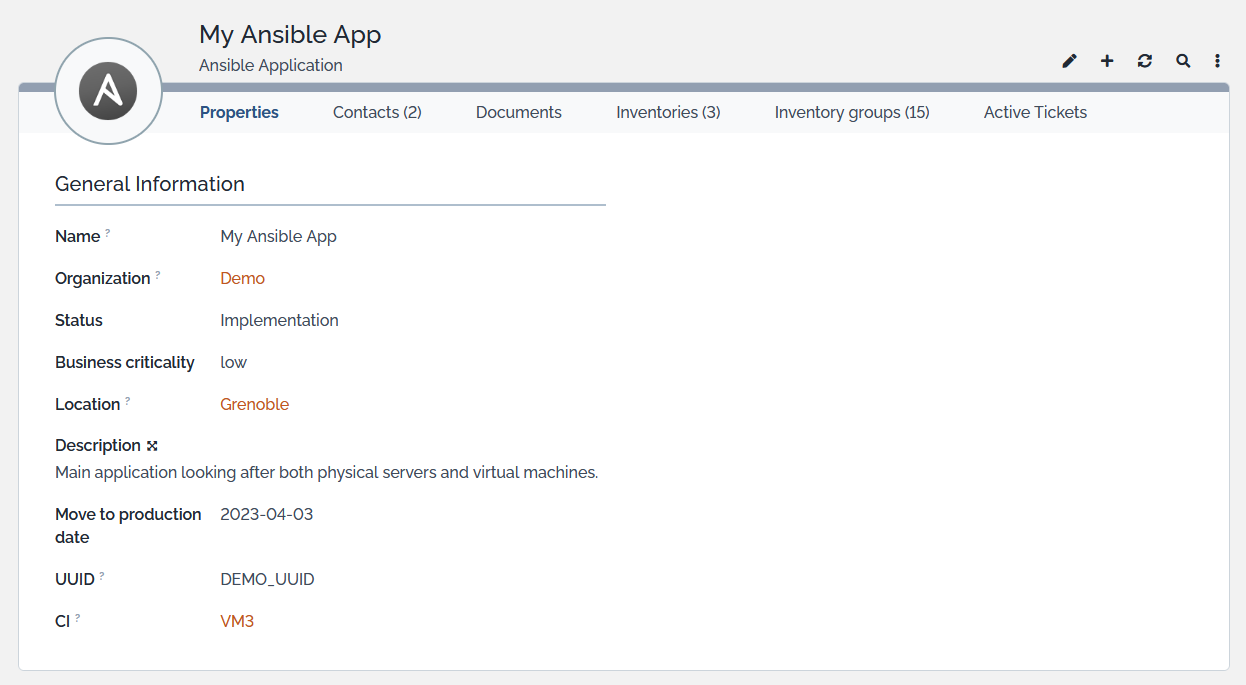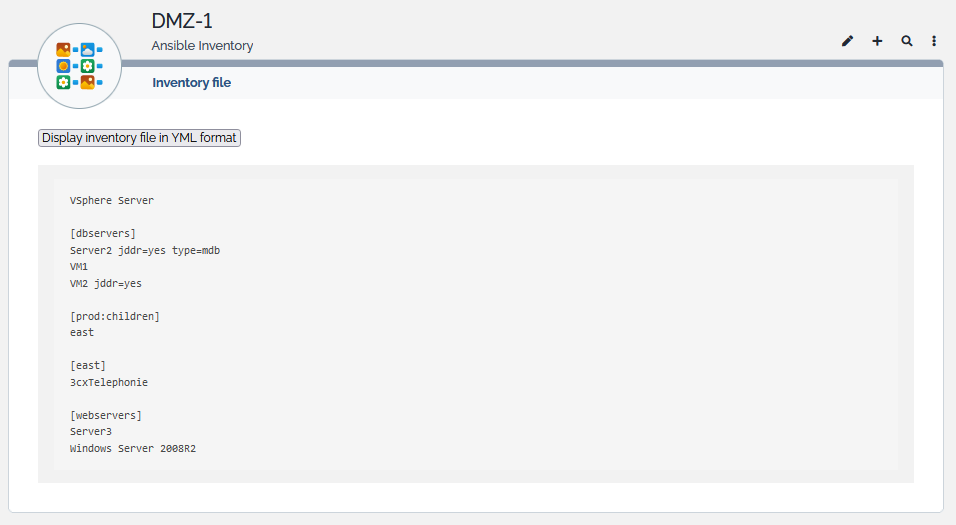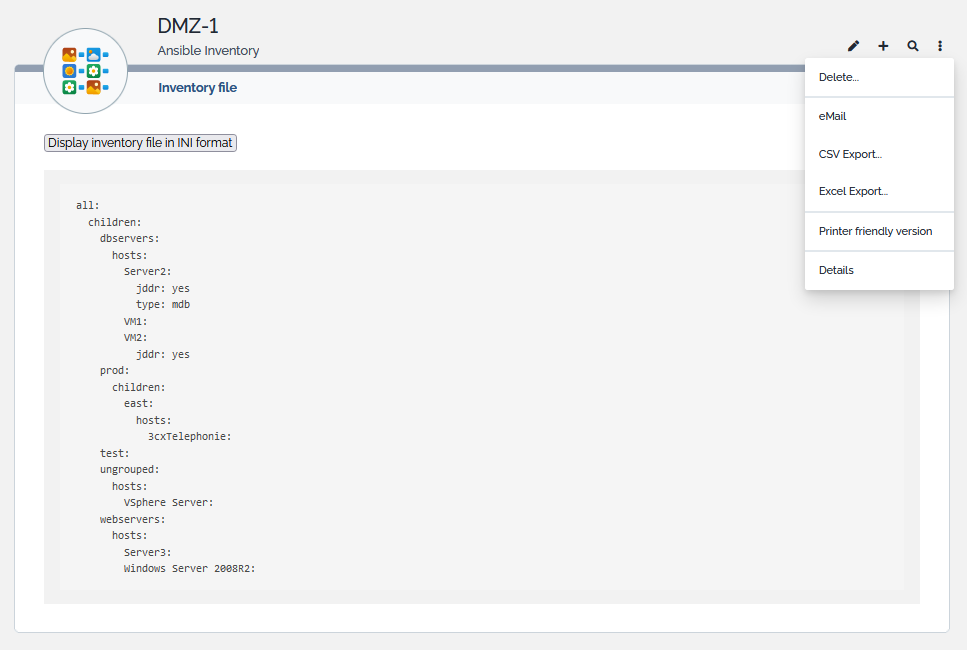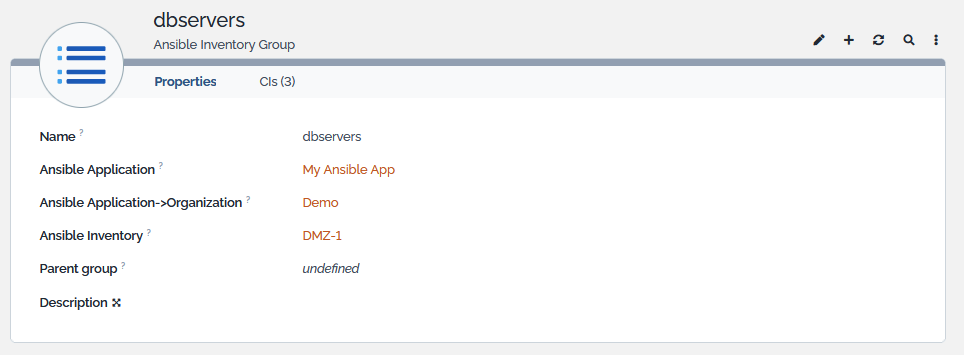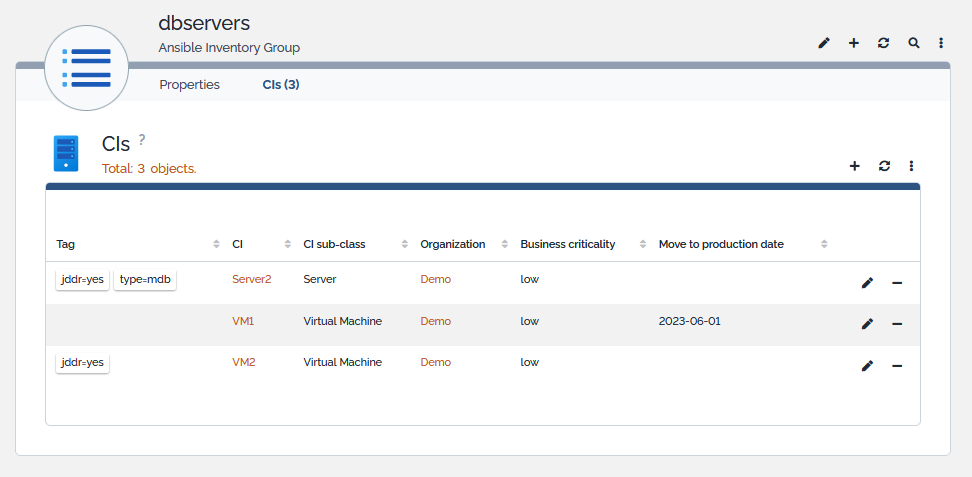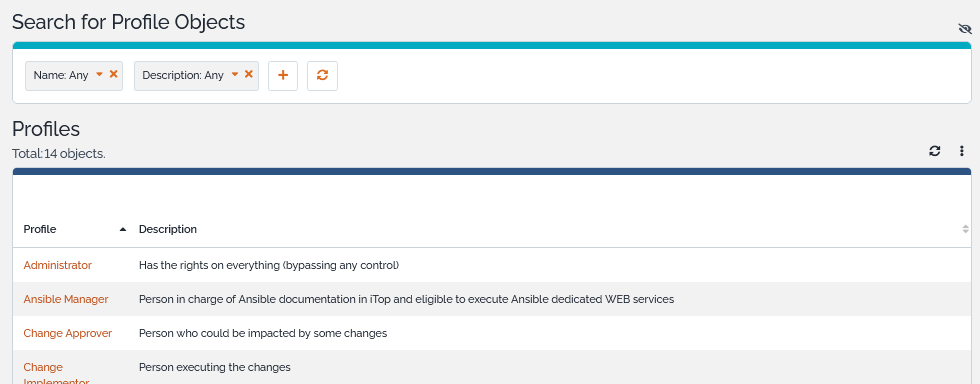Data model for Ansible
- name:
- Data model for Ansible
- description:
- Modelization of Ansible inventories in iTop
- version:
- 1.0.0
- release:
- 2023-11-07
- itop-version-min:
- 2.7
- code:
- combodo-ansible-datamodel
- state:
- Stable
- php-version-max:
- PHP 8.1
This extension is dedicated to Ansible, the application that automates the management of remote systems and controls their desired state. It enriches iTop's CMDB by modelizing Ansible inventories which enforces the central role of iTop for all CMDB matters. Together with the Ansible playbooks for iTop, it enables Ansible administrators and developpers to fetch in iTop, directly from Ansible playbooks, tasks or modules, CMDB related information like inventory files or list of hosts to work on.
Features
When installed on iTop, the extension creates a set of different classes that represent Ansible objects. These classes are displayed in a specific dashboard that is accessible from a submenu of the standard CMDB overview menu.
Revision History
| Version | Release Date | Comments |
|---|---|---|
| 1.0.0 | 2023-09-24 | First version |
Limitations
The model brings a TagSet attribute on a n:n relation. Such attribute cannot be changed on iTop 2.7 nor iTop 3.0 and therefore cannot be used with these versions.
Requirements
The extension can only be installed on iTop 2.7.x and above, including iTop 3.x, of course
Installation
Use the Standard installation process for this extension. It can be installed on any iTop datamodels as it just depends on iTop configuration management module, which is a core module that is always activated.
Configuration
By default, the extension limits the class of CIs that can be
attached to an Inventory group. A configuration parameter allows
you to overload this default behaviour.
The section below is by default hidden in the configuration file,
you have to copy it from below if you need to adapt the list of CI
classes.
- Configuration
-
'combodo-ansible-datamodel' => array ( 'ci_classes_in_inventory_groups' => array ( 0 => 'Server', 1 => 'VirtualMachine', 2 => 'AzureVirtualMachine', 3 => 'ApplicationSolution', ), ),
| Parameter | Meaning | Default |
|---|---|---|
| ci_classes_in_inventory_groups | List of classes of CIs that can be linked to an Inventory group | Server, VirtualMachine, ApplicationSolution |
-
When the ci_classes_in_inventory_groups list is updated, no action is taken on CIs which are already attached to an inventory and whose class no longer appears in the list.
-
However, such CIs are automatically removed form the inventory files and lists generated on the fly.
Usage
Ansible Application
![]() This class modelizes the
well-known Ansible applications from which CIs can be managed via
commands applied to inventories.
This class modelizes the
well-known Ansible applications from which CIs can be managed via
commands applied to inventories.
Ansible Application Properties
Tabs
| Tab | Description |
|---|---|
| Contacts | All the contacts linked to the application |
| Documents | All the documentation related to the application |
| Inventories | All inventories attached to the application |
| Inventory groups | All inventory groups attached to the application through inventories |
-
The UUID is the universal unique identifier of the application within iTop. It has no link with similar parameter that may exist within an Ansible instance.
-
The CI attribute defines where the Ansible controller is hosted.
Ansible Inventory
![]() An inventory is a list
of managed nodes, or hosts, that Ansible deploys and configures.
These hosts can be classified within groups.
An inventory is a list
of managed nodes, or hosts, that Ansible deploys and configures.
These hosts can be classified within groups.
Ansible Inventory Properties
Tabs
| Tab | Description |
|---|---|
| Inventory groups | All inventory groups attached to the inventory |
| CIs | All the CIs attached to an inventory group belonging to the inventory |
Display inventory file
From the “Other actions” menu of an Ansible inventory, the “Display inventory file” menu will let you visualize the entire inventory as a file in INI or YAML formats.
-
A button on the top of the “file” allows you to switch from one format to the other.
-
The Details menu will bring you back to the details page of the inventory.
Ansible Inventory Group
![]() These hierarchical
objects are used to classify hosts and decide which hosts are
controlled, when and for what purpose.
These hierarchical
objects are used to classify hosts and decide which hosts are
controlled, when and for what purpose.
Ansible Inventory Group
Tabs
| Tab | Description |
|---|---|
| CIs | All the CIs that belong to the group |
CI to Inventory group relation
This relation hosts a Tag attribute.
-
This field is defined as an iTop tagset attribute,
-
Several tags can therefore be added to the relation (maximum 12),
-
All values will appear in inventory files, according to Ansible standards.
Special "ungrouped" Inventory group
The group called “ungrouped” is a mandatory object in YAML inventories. It contains all CIs that are not attached to a specific Inventory group. This is not the case with INI inventories where such CIs are directly attached to the root of the file. Regardless of the format, CIs that should not be attached to a group must be attached to the ungrouped group in iTop.
Virtual Machine
![]() In iTop standard data
model, Virtual Machines are linked to a Virtual Host i.e. the
vCluster or Hypervisor on which they have been activated. This link
is mandatory… which may cause problems when virtual machines are
created from Ansible as their virtual host is not always known by
the playbooks in charge of their creation (Ansible
playbooks for iTop extension) or by the facts gathered from the
Ansible controller (Data
collector for Ansible).
In iTop standard data
model, Virtual Machines are linked to a Virtual Host i.e. the
vCluster or Hypervisor on which they have been activated. This link
is mandatory… which may cause problems when virtual machines are
created from Ansible as their virtual host is not always known by
the playbooks in charge of their creation (Ansible
playbooks for iTop extension) or by the facts gathered from the
Ansible controller (Data
collector for Ansible).
Ansible Manager Profile
The extension brings with it the new profile “Ansible Manager” which has full rights on all classes brought by the extensions as well as read rights over the General, Configuration and Documentation groups.
Ansible Web Services
In addition to the classes described above, the extension provides a set of WEB services dedicated to Ansible. Based on iTop standard REST/JSON interface, they can be used to retrieve inventory files or host lists from third-party applications such as Ansible.
Operation: ansible/get_webservices_version
Provides the version currently used for iTop WEB services dedicated to Ansible.
Required parameters: None
For example, passing the following json_data:
{ "operation": "get_webservices_version" }
will return the information:
“Running version of the iTop WEB services dedicated to Ansible is: 1.0”
Operation: ansible/get_inventory
Get an inventory defined for an Ansible application.
Required parameters:
| Name | Description | Example |
|---|---|---|
| uuid | UUID of the Ansible application | DEMO_UUID |
| inventory | Name of the inventory to consider | DMZ-1 |
| format | Expected format | yml, ini |
For example, passing the following json_data:
{ "operation": "ansible/get_inventory", "uuid": "DEMO_UUID", "inventory": "DMZ-1", "format": "yml" }
will return the “DMZ-1” inventory file in YAML format, like the one displayed in the previous chapter.
Operation: ansible/get_hosts_by_oql
Get a subset of hosts belonging to an inventory defined for an Ansible application.
Required parameters:
| Name | Description | Example |
|---|---|---|
| uuid | UUID of the Ansible application | DEMO_UUID |
| inventory | Name of the inventory to consider | DMZ-1 |
| oql | OQL that defines the list of hosts to retrieve | SELECT VirtualMachine |
| attribute | Host's attribute to be provided in the list | name |
For example, passing the following json_data:
{ "operation": "ansible/get_inventory", "uuid": "DEMO_UUID", "inventory": "DMZ-1", "OQL": "SELECT VirtualMachine", "attribute": "name" }
will return, as a list, the names of the virtual machines belonging to “DMZ-1” inventory:
“3cxTelephonie,VM1,VM2,VSphere Server,Windows Server 2008R2”
Ansible playbooks for iTop
The Ansible web services have been embedded in “ready to use” Ansible playbooks that can be integrated in any Ansible scripts (playbooks, tasks or modules). Please, refer to the Ansible playbooks for iTop documentation.


